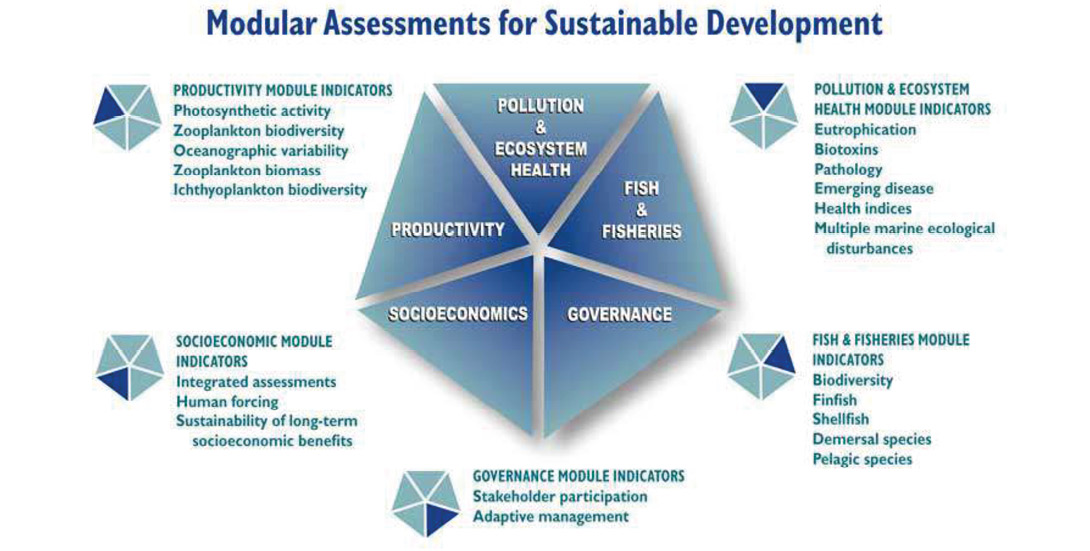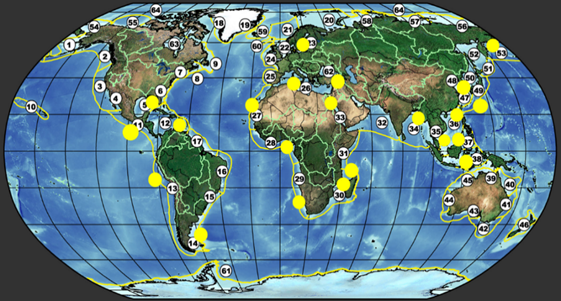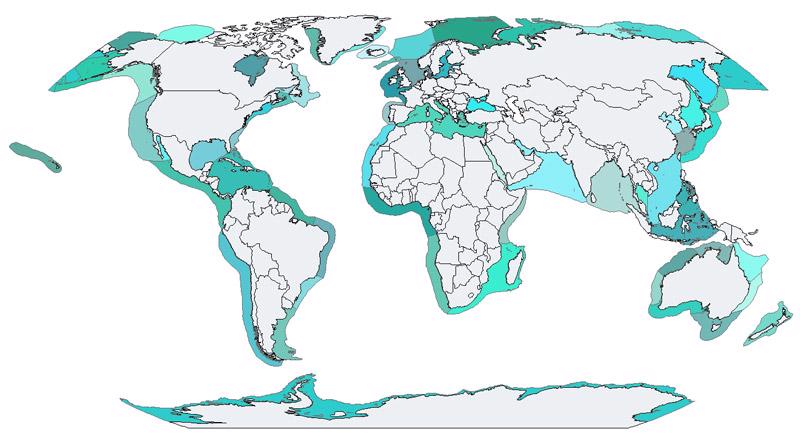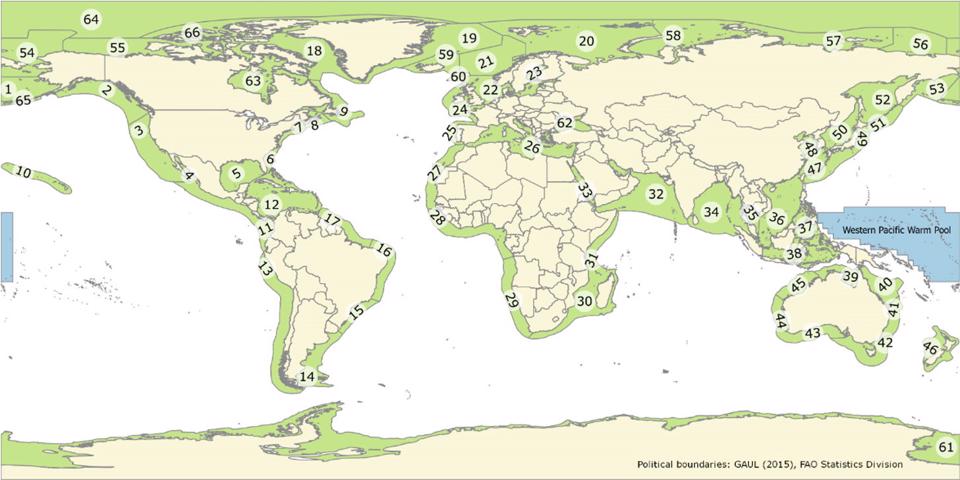Large Marine Ecosystems Sustainable Oceans Portfolio
LARGE MARINE ECOSYSTEMS: SUSTAINABLE OCEANS PORTFOLIO
Actions and Results of the Large Marine Ecosystems Network Supporting the United Nations Decade of Ocean Science for Sustainable Development, 2021-2030
Kenneth Sherman
Betsy Peterson
Editors
Supported by
Scientific Committee on Problems of the Environment (SCOPE);
IW:LEARN/Intergovernmental Oceanographic Commission-UNESCO/UNDP/GEF;
Coastal Resources Center, Graduate School of Oceanography, University of Rhode Island;
The Global Environment Facility
December 2020
About the Portfolio
The Portfolio brings together examples of best natural science and social science practices for assessing and managing the world’s Large Marine Ecosystems (LMEs). It is available to the marine science and marine management communities at https://iwlearn.net/marine.
The Portfolio is intended for wide distribution in support of the United Nations 2030 goal and targets for sustainable development of the oceans (SDG 14) and the UN 2021-2030 Decade of Ocean Science for Sustainable Development.
Large Marine Ecosystems (LMEs) are located along the margins of the continents. They produce 80% of the world’s annual marine fisheries catch1 and their spatial domains contribute an estimated $27.7 trillion in ecosystem services annually to the global economy2.
Since the seminal symposium on LMEs at the annual meeting of the American Association for the Advance of Science (AAAS) in 1984, 18 volumes of studies on LMEs and 390 journal articles have been published by over 450 authors.
During the past 36 years, the movement towards assessment and management of the world’s LMEs has been growing along with the awareness by the United Nations of the need for reducing environmental and human stressors on the planet and advancing the sustainable development of the world’s oceans.
The Portfolio provides results of selected best scientific practices in support of LME assessment and management.
The Portfolio is arranged in four parts:
- Part I. The LME Approach
- Part II. LME Assessment and Management Applications Around the Globe
- Part III. LME Best Practices
- Part IV. Results of 2020 Global Ocean Series Webinar
A glossary of abbreviations used in the Portfolio follows Part IV.
Part I. The LME Approach
1. Boundaries of LMEs are defined on the basis of four ecological criteria – bathymetry, hydrography, productivity, and trophic linkages. They are relatively large areas of coastal ocean space of 200,000 km² or greater (Fig. 1).

Figure 1. The world’s 66 Large Marine Ecosystems.
2. The LME assessment and management approach is based on the application of five modules of indicators of changing conditions including three suites of natural science indicators of (i) productivity (gCm²yˉ¹), (ii) fish and fisheries, and (iii) pollution and ecosystem health and two suites of social science indicators including (iv) socioeconomics, and (v) governance. The science-based modules support LME assessment and management actions for the sustainable development of coastal ocean goods and services (Fig. 2).


Figure 2. The five-module indicator approach to the assessment and management of LMEs.
3. The LME approach was introduced to the science community in 1984 at the annual meeting of the American Association for the Advancement of Science (AAAS)3. The scientific foundations of the LME approach have been strengthened by the studies and results of over 450 marine scientists and resource specialists appearing in 18 LME volumes published by AAAS (4 vols.), Westview Press (1 vol.), Blackwell Science (4 vols.), Elsevier Science (5 vols.), IUCN (2 vols.), UNDP-GEF (2 vols.), and 392 journal articles. An annotated bibliography of LME literature has been published4 and is available from https://spo.nmfs.noaa.gov/sites/default/files/TM167.pdf.
4. The LME approach to the assessment and management of coastal oceans goods and services was recognized by NOAA as one of the ten most noteworth and transforming breakthroughs during its 200 year anniversary in 2008. (https://celebrating200years.noaa.gov/breakthroughs/ecosystems/welcome.html)
Part II. LME Assessment and Management Applications Around the Globe Supporting the United Nations Ocean Sustainability Policy
1. The pragmatic adaptation of the LME approach to ecosystem-based management (EBM) and the sustainable development of the oceans is presently underway in LME projects in over 100 economically developing nations in Africa, Asia, Latin America, and eastern Europe LMEs5 (Fig. 3).

Figure 3. 110 Participating countries and 22 LMEs with GEF supported EBM projects including: (5) Gulf of Mexico LME; (12) Caribbean Sea LME; (13) Humboldt Current LME; (14) Patagonian Shelf LME; (23) Baltic Sea; (26) Mediterranean Sea LME; (27) Canary Current LME; (28) Guinea Current LME; (29) Benguela Current LME; (30) Agulhas Current LME; (31) Somali Coastal Current LME; (32) Arabian Sea LME; (33) Red Sea LME; (34) Bay of Bengal LME; (35) Gulf of Thailand; (36) South China Sea LME; (37) Sulu-Celebes Sea LME; (38) Indonesian Sea LME; (47) East China Sea; (48) Yellow Sea LME; (53) West Bering Sea; and (62) Black Sea. Numbers in parentheses show location of LMEs from (1) to (66).
2. The LME projects are supported with $6.01 billion in catalyzed financial assistance from the Global Environment Facility (GEF). The GEF is a financial institution established in the early 1990s to support economically developing countries to mitigate environmental stressors on sustainable development of their emerging marine economies including fisheries, energy, transportation, tourism, and mining.
3. In 1995, the GEF included the LME approach in their operating guidelines. In the intervening 26 years a global movement towards sustainable development of LME goods and services has been provided with scientific and technical support from five United Nations organizations (UNDP, UNEP, UNIDO, FAO, and IOC-UNESCO), two NGOs (IUCN, WWF), two financial organizations (GEF, World Bank) and several national ocean research and assessment organizations in the United States (NOAA), Germany (GIZ), Norway (IMR, NORAD), and Sweden (SIDA)6.
4. The LME global movement7 has been advancing in a pathway parallel to the United Nations policies emerging from three world conferences on the environment focused on mitigating the effects of human and environmental stressors on the planet: the United Nations Conference on Environment and Development (UNCED) in 19928; the World Summit on Sustainable Development (WSSD) in 20029; and the United Nations Conference on Environment and Development (UNCED +20) convened in Rio in 201210.
5. In 2015, the UN included a specific goal and targets for sustainable development of the oceans from an ecosystems perspective (SDG 14)11. And in 2019, the UN adopted a proclamation for designating the years 2021-2030 as the Decade of Ocean Science for Sustainable Development12.
Part III. LME Best Practices in Support of UN Ocean Goal and Targets for Sustainable Ocean Development
In support of meeting the objectives of UN SDG 14 and the Decade of Ocean Science, this Portfolio brings together relevant actions and results for achieving SDG 14 targets.
1. Definitive LME Volume
A 694-page e-book of 50 chapters of selected published best science practices in support of LME sustainable development titled Ocean Sustainability, Assessing and Managing the World’s Large Marine Ecosystems. The selected papers from the published LME literature are examples of best practices for supporting an ecosystems-based approach to LME assessment and management based on the results of studies of LME (i) productivity, (ii) fish and fisheries, (iii) pollution and ecosystem health, (iv) socioeconomics, and (v) governance. The e-book is available on request from IW:LEARN and SCOPE.
2. LMEs and UN Sustainable Development Goal for the Ocean
The GEF LME:LEARN 20 pg. booklet published in 2017 titled The Large Marine Ecosystems Approach, An Engine for Achieving SDG 14 (2017) can be downloaded from https://www.iwlearn.net/documents/23964.
3. LME Encyclopedia Definition
A recent description of the LME assessment and management movement toward sustainable development titled Large Marine Ecosystems is published in Encyclopedia of Ocean Sciences, 3rd Edition (2019), vol. 1, pp 709-723, (eds.) J. K. Cochran, J. H. Bokuniewicz, and P. L. Yager (Elsevier, The Netherlands). See Chapter 1 in e-book Ocean Sustainability, Assessing and Managing the World’s Large Marine Ecosystems.
4. LME Documentary Film
A 26-minute DVD illustrating the LME approach titled Turning the Tide: Sustaining Earth’s Large Marine Ecosystems developed in collaboration with Francoise Odendaal, UNDP, GEF and NOAA can be viewed at https://www.youtube.com/watch?v=-Cr7QiGmbCQ.
5. LME Self-Learning Certification Course
Access to a free 6-week self-learning course developed by NOAA and the University of Cape Town titled Large Marine Ecosystems Assessment and Management, available on the Coursera platform www.coursera.org/learn/large-marine-ecosystems.
6. LME Bibliography
An annotated bibliography of LME volumes and journal articles has been published titled Large Marine Ecosystems of the World: An Annotated Bibliography. It is available from https://spo.nmfs.noaa.gov/sites/default/files/TM167.pdf.
Part IV. Results of 2020 webinar titled Global Ocean Series, Linking Large Marine Ecosystems to Local Science and Management for Sustainable Development
1. Report of the Global Ocean Series
A series of webinars focused on linking the scales of assessment and management practices from local to national to international and the entire spatial domains of LMEs was conducted from 20 May to 26 June 2020. The series was organized by the Coastal Resources Center of the University of Rhode Island, IOC-UNESCO, IW:LEARN, UNDP, GEF, and the Walton Family Foundation. The webinar series was well attended with over 250 participants from more than 40 countries. The summary report of the webinars includes three recommendations: 1) better understanding of connections between coastal and ocean processes on multiple scales and different time frames; 2) improved communication among professionals and stakeholders conducting the studies at different scales is essential; and 3) encourage greater effort in the collaboration among stakeholders, including between developers and managers. The report is available at https://iwlearn.net/marine.
2. LME Theme Volumes Relevant to the 2020 Webinar Series
Examples of studies relevant to the webinar series report recommendations can be found in results of multiple scale assessments in a number of LME papers published in four special issues of the Elsevier Science journals Environmental Development and Deep-Sea Research Part II: Topical Studies in Oceanography. Titles and authors of these studies reaching a large readership are provided in the following links.
- Ecosystem Based Management of Large Marine Ecosystems (ENVDEV, vol. 17, Part 1, 2016) https://www.sciencedirect.com/journal/environmental-development/vol/17/suppl/S1
- Large Marine Ecosystems of Latin America and the Caribbean: Assessment, Sustainability, and Management (ENVDEV, vol. 22, 2017)
https://www.sciencedirect.com/journal/environmental-development/vol/22/suppl/C - Large Marine Ecosystems of Asia: Assessment, Sustainability, and Management (DSRII, vol. 163, 2019) https://www.sciencedirect.com/journal/deep-sea-research-part-ii-topical-studies-in-oceanography/vol/163/suppl/C
- Large Marine Ecosystems of Africa: Assessment, Sustainability, and Management (ENVDEV, vol. 36, December 2020) https://www.sciencedirect.com/journal/environmental-development/vol/36/suppl/C
References
- Pauly, D., Lam, V.W.Y. 2016. Chapter 6.1: The Status of fisheries in large marine ecosystems, 1950–2010. In IOC-UNESCO and UNEP (2016). In Large Marine Ecosystems: Status and Trends, pp 113-137. United Nations Environment Programme, Nairobi.
- Kubiszewski, I., R. Costanza, S. Anderson, P. Sutton. 2017. The future value of ecosystem services: Global scenarios and national implications. Ecosystem Services, 26 (2017): 289-301.
- Sherman, K. and L. M. Alexander (eds). 1986. Variability and Management of Large Marine Ecosystems. American Association for the Advancement of Science (AAAS) Selected Symposium 99. Westview Press, Colorado. 319p.
- Kelley, E. (ed). 2016. Large marine ecosystems of the world: an annotated bibliography. NOAA Technical Memorandum NMFS-F/SPO-167, 94p.
- Sherman, K. 2014. Toward ecosystem-based management (EBM) of the world's large marine ecosystems during climate change. Environmental Development 11:43-66.
- Sherman, K. 2019. Large Marine Ecosystems. In Encyclopedia of Ocean Sciences, 3rd Edition, vol. 1, pp 709-723. Edited by J. K. Cochran, J. H. Bokuniewicz, P. L. Yager. Elsevier, The Netherlands.
- Sherman, Kenneth, Michael Sissenwine, Villy Christensen, Alfred M. Duda, Gotthilf Hempel, Chidi Ibe, Si Levin, Daniel Lluch-Belda, Gennady Matishov, Jacqueline McGlade, Michael O'Toole, Sibyl Seitzinger, Hein Rune Skjoldal, Qisheng Tang, Jan Thulin, Veerle Vandeweerd, and Kees Zwanenburg. 2005. A global movement toward an ecosystem approach to marine resources management. Marine Ecology Progress Series (Theme Section: Politics and socio-economics of ecosystem-based management of marine resources), 300: 275-279.
- UNCED. 1992. United Nations Conference on Environment & Development, Rio de Janeiro, Brazil, 3-14 June 1992. Agenda 21, United Nations Sustainable Development, 351p. (Statements relative to ocean sustainability read as follows: 17.22 Prevent, reduce and control degradation of the marine environment so as to maintain and improve its life- support and productive capacities; 17.46 Develop and increase the potential of marine living resources to meet human nutritional needs, as well as social, economic and development goals; 17.5 Integrated management and sustainable development of coastal areas and the marine environment under their national jurisdiction.)
- WSSD. 2002. Report of the World Summit on Sustainable Development, Johannesburg, South Africa, 26 August to 4 September 2002. United Nations, A/CONF.199/20/Corr.1, United Nations, New York, NY, USA, 167p. (Reference to ocean sustainability reads as follows: 30d Encourage the application by 2010 of the ecosystem approach, noting the Reykjavik Declaration on Responsible Fisheries in the Marine Ecosystem and decision V/6 of the Conference of Parties to the Convention on Biological Diversity; 33d Make every effort to achieve substantial progress by the next Global Programme of Action Conference in 2006 to protect the marine environment from land-based activities; 32c Develop and facilitate the use of diverse approaches and tools, including the ecosystem approach, the elimination of destructive fishing practices, the establishment of marine protected areas consistent with international law and based on scientific information, including representative networks by 2012; 31a Maintain or restore [fisheries] stocks to levels that can produce the maximum sustainable yield with the aim of achieving these goals for depleted stocks on an urgent basis and where possible not later than 2015.)
- UNCED. 2012. Outcome Document: The Future We Want. United Nations Conference on Sustainable Development: Rio +20, A_CONF.216/ L.1. United Nations Department of Economic and Social Development, United Nations, 24p. (Reference to ocean sustainability reads as follows: Paragraph 158 We therefore commit to protect and restore, the health, productivity and resilience of oceans and marine ecosystems, and to maintain their biodiversity, enabling their conservation and sustainable use for present and future generations; Effectively apply an ecosystem approach and the precautionary approach in the management, in accordance with international law, of activities having an impact on the marine environment.)
- UN General Assembly SDG14. See website https://sustainabledevelopment.un.org/sdg14. (Target 14.2 states “By 2025, sustainably manage and protect marine and coastal ecosystems to avoid significant adverse impacts, including by strengthening their resilience, and take action for their restoration in order to achieve healthy and productive oceans.”)
- UN Decade of Ocean Science for Sustainable Development. See websites https://en.unesco.org/ocean-decade and www.oceandecade.org.
Abbreviations
AAAS - American Association for the Advancement of Science
DSRII - Deep-Sea Research Part II
EBM - Ecosystem-Based Management
ENVDEV - Environmental Development
FAO - Food and Agriculture Organization
GEF - Global Environment Facility
GIZ - Deutsche Gesellschaft für Internationale Zusammenarbeit
IMR - Institute of Marine Research (Norway)
IOC - International Oceanographic Commission
IUCN - International Union for Conservation of Nature
IW:LEARN - International Waters Learning Exchange and Resource Network
LME - Large Marine Ecosystem
NGO - Non-Governmental Organization
NOAA - National Oceanic and Atmospheric Administration
NORAD - Norwegian Agency for Development Cooperation
SCOPE - Scientific Committee on Problems of the EnvironmenSIDA
SDG - Sustainable Development Goal(United Nations)
SIDA - Swedish International Development Cooperation Agency
UN - United Nations
UNCED - United Nations Conference on Environment and Development
UNCLOS - United Nations Conference on Law of the Sea
UNDP - United Nations Development Programme
UNEP - United Nations Environment Programme
UNESCO - United Nations Educational, Scientific and Cultural Organization
UNIDO - United Nations Industrial Development Organization
WSSD - World Summit on Sustainable Development
WWF - World Wildlife Fund




